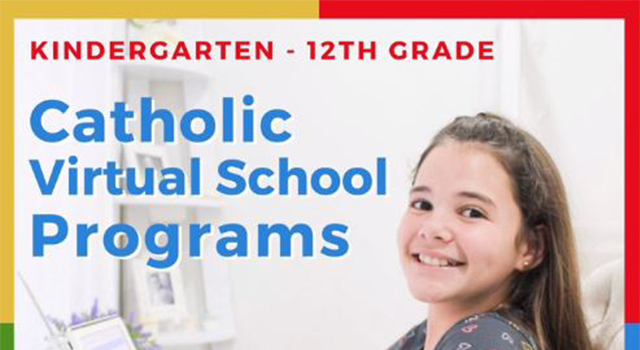By Cristina Cabrera Jarro -
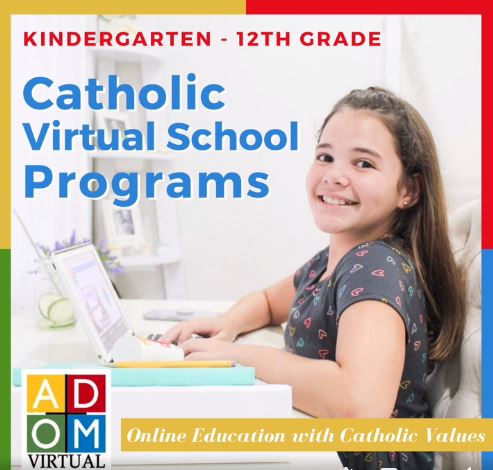
Photographer: COURTESY PHOTO
A screenshot from an ADOM Virtual Catholic School online promo.
MIAMI | Virtual and online school. Distance and remote learning. These buzzwords refer to the way most schools have functioned since March 2020, when the COVID-19 pandemic forced a digital revolution that neither teachers, students, parents, or even internet providers were fully prepared for.
But one Catholic school was unaffected by the COVID-19 transition to digital classrooms and online learning: ADOM-VCS, the virtual Catholic school of the Archdiocese of Miami.
“For me, when I say, 'virtual school,' it means my particular school, Archdiocese of Miami Virtual Catholic School. Essentially, we never closed. It really is available year-round, if needed,” said Rebeca Bautista, principal of ADOM-VCS.
Entering its seventh year, ADOM-VCS is accredited by Cognia, and, until recently, was the only archdiocesan-supported virtual Catholic school in the United States (the Diocese of Arlington launched St. Isidore of Seville Virtual School on September 8).
ADOM-VCS has the seal of approval from the archdiocese’s superintendent of schools, Kim Pryzbylski, as well as Archbishop Thomas Wenski and the U.S. Conference of Catholic Bishops. The school is also registered with the Florida Department of Education and The College Board, which recognizes ADOM-VCS’s curriculum, credit recovery courses and high school diploma.
Earlier this year, the school beta tested its Kindergarten through fifth grade curriculum, making ADOM-VCS a fully online elementary, middle and high school.
“Some parents are wanting pure virtual now and they’ve gone to ADOM-VCS because it is an established school,” said Pryzbylski.
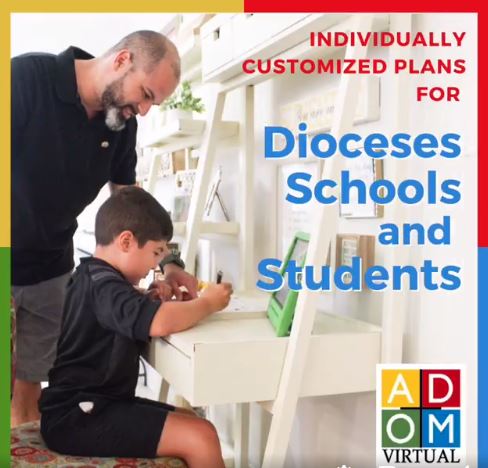
Photographer: COURTESY PHOTO
A screenshot from an ADOM Virtual Catholic School online promo.
The curiosity, however, doesn’t come entirely from South Florida. Families across the country, and even a few outside, have reached out because they are looking for options as they wait for decisions from their own dioceses and local school boards as to how their students will return to school.
ADOM-VCS can enroll students for a quarter, a semester, or a year-long curriculum. So far, the first quarter option (August through December 2020), has the most pending enrollments.
ASYNCHRONOUS EDUCATION
While the obvious distinction of ADOM-VCS is that it is not a traditional brick-and-mortar campus, neither are its classes bound by time. They occur asynchronously, with pre-recorded lessons and no real-time interaction during class.
“It is different at ADOM-VCS than it is in the virtual classrooms that schools have created [for Covid-19 and distance learning]. This was designed for students to be able to log on at any time and be able to do things at their own pace, whereas what they’re doing in the schools now, it’s the traditional curriculum, and the traditional school day, Monday through Friday, with a teacher,” said Pryzbylski.
“It’s really a parental choice, and most parents, especially with the little ones, they want their children with their teachers. It’s different ways of delivering instruction, and that’s critical because parents should really be able to choose which type of instruction they believe their child should have,” Pryzbylski added.
With ADOM-VCS, “you can follow a traditional 8 a.m. to 3 p.m. schedule, or you can log in in the morning, in the afternoon, or on the weekends,” said Bautista.
To be clear, teachers are assigned to each course and they do check-in with students and parents weekly. (Most of them teach at brick-and-mortar Msgr. Edward Pace High and other archdiocesan schools.)
While some parents appreciate the independence, Bautista cautions that it may be a difficult transition for students who don’t have the discipline.
“A second-grader creating their own schedule will be completely different than a senior who says 'I got this.' It’s a completely different expectation. Parents want structure, for the most part, or a routine, and we do have one, but it’s up to each individual student or family member to decide what that is,” said Bautista.
Virtual education is not easier, she added: "We’re a fully accredited school. If you’re going to earn half a credit from us, you’re going to do the work that merits half a credit.”
CATHOLIC, ONLINE, ANYWHERE
Annette Wedin discovered ADOM-VCS while living in Birmingham, Alabama. She had been searching for alternate educational options for her sons, Austin and Jason. The local Catholic high school, John Carroll High, which partners with ADOM-VCS, recommended the virtual school option, and the family found a match.
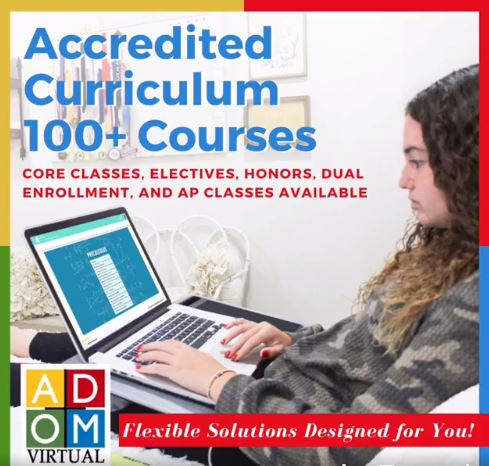
Photographer: COURTESY PHOTO
A screenshot from an ADOM Virtual Catholic School online promo.
“I don’t look at it as homeschooling. I look at it as my kids went to a Catholic school, and it just happened to be that it was online. You have everything that you get at a school, you’re just not sitting in front of the teacher," said Wedin "They still have their curriculum and work to do, but they can do it at their own pace and time.”
Both of her sons graduated from ADOM-VCS and are attending Arizona State University, with Austin pursuing a degree in law, and Jason in healthcare.
The flexibility of the ADOM virtual school came as a blessing for Susana Moro, a Spanish-born, Miami-based mom of three, who was diagnosed with acute lymphoblastic leukemia in 2016. The treatment kept Moro in the hospital for four months. At the time, her eldest daughter, Valeria, was a freshman atImmaculata-La Salle High, and she began experiencing depression and difficulties at school.
“She was not happy, and when a teenager is not happy you have a problem,” said Moro.
Moro’s husband, Jason Quimby, discussed options with ILS' principal, Salesian Sister Kim Keraitis, who recommended ADOM-VCS.
“Acknowledging Valeria’s wishes made the difference in our case. I told her, these are your options. Obviously, you need to do high school, and these are the things we can offer you,” said Moro.
Quimby had been homeschooled and was familiar with how things worked, so Moro felt relieved, and hoped that the new educational path would work for her daughter as well.
“She was getting good grades, but we still hired a tutor for math and science, which was the case for her when she was attending regular school,” said Moro.
She also set up a weekly allowance system tied to Valeria’s weekly grades.
In March 2017, Moro was told that she needed a transplant, but the procedure was not offered in Miami at the time. So the family moved to New York, where they remained for a year. Valeria continued at ADOM-VCS, while her sisters attended schools in the city.
When they returned to Miami in 2018, Sister Kim reminded them that Immaculata-La Salle’s doors were still open for Valeria. “But Valeria said, 'Mom, I really like doing ADOM [VCS]'," Moro said. She graduated in the spring of 2020 and was accepted to her “dream school,” the University of Hawaii, where she will major in philosophy and minor in botany.
Moro’s youngest daughter, Patricia, also attended ADOM-VCS. She took a dual enrollment Spanish class during her eighth-grade year at St. Hugh School in Coconut Grove. The credit she earned allowed her to advance to Spanish 3 Honors her freshman year of high school.
Currently, Patricia and her older sister, Natalia, are attending Immaculata-La Salle virtually, until classes resume in person. With her health in mind, as well as the safety of her daughters, Moro will opt for a hybrid system when they return to school. She remains grateful to ADOM-VCS, but her daughters choose to attend a traditional brick and mortar school.
“At the end of the day, ADOM-VCS is representing the Archdiocese of Miami,” said Bautista. “It’s a product that has to reflect not just one school, but an entire community of Catholic educators.”
FAST FACTS ABOUT ADOM-VCS
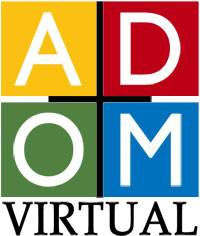
- Courses offer a core Catholic identity, regardless of subject.
- Courses include core classes, AP, Honors, electives and more.
- Kindergarten through 12 grade curriculums available completely online.
- High school dual enrollment courses for grades 6-8.
- The Adult Learning Program offers catechist certification and professional development.
- ADOM-VCS is tuition-based, and offers classes on a quarterly, semester, or year-long curriculum.
- ADOM-VCS is local to Miami, but has students throughout the state, the country, and even outside the U.S.
- Visit www.adomvirtual.com for more information or call 305-508-5556. Follow them on social media @adomvcs.
